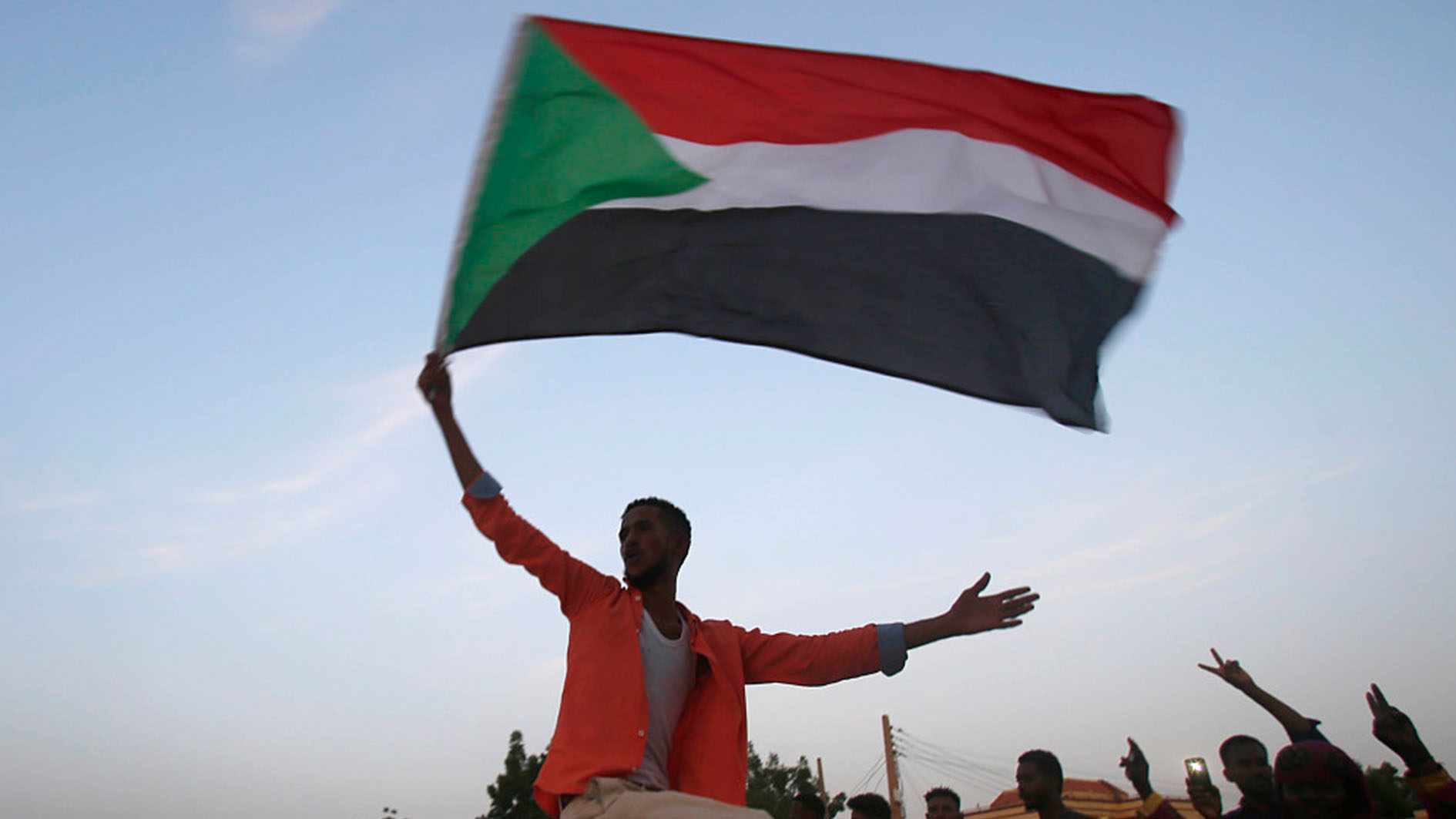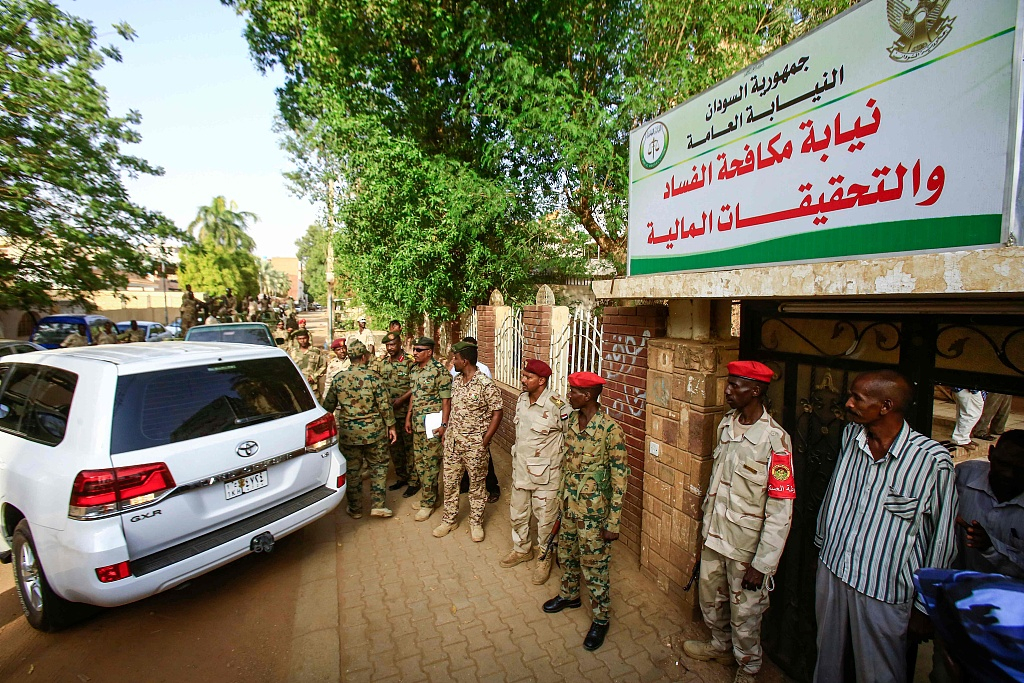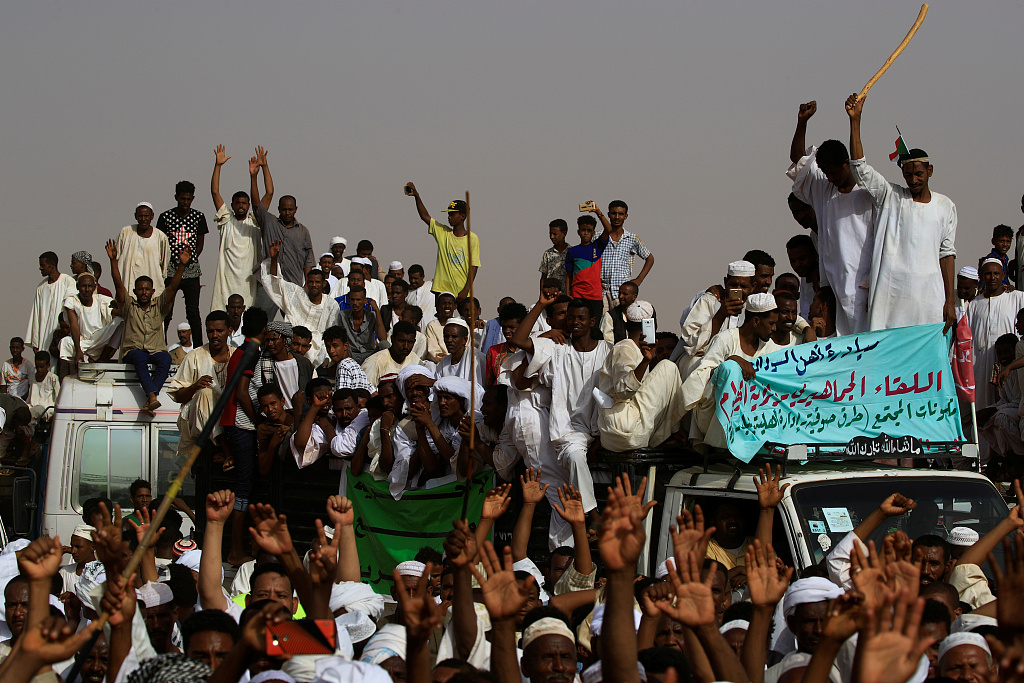

On Sunday, June 30, at the 30th anniversary of the coup that put Omar Al-Bashir in power in Sudan, thousands of people took to the streets demanding the country be led by a civilian – now that Bashir is gone.
Military generals and protest leaders traded blame for the escalation into violence – with security forces using tear gas and live fire against the protesters. The number of deaths also varies, depending on who you ask, from six to 11. Bashir was ousted by the military in April, following months of popular protest. Since then, a transitional military council has run Sudan.

Members of paramilitary Rapid Support Forces stand guard outside the anti-corruption prosecution's offices, Khartoum, Sudan, June 16, 2019. /VCG Photo
Bashir came to power in 1989. Ambassador David Shinn, the former deputy chief of mission at the U.S. Embassy in Sudan, points out that in the past 30 years, the Sudan government has been extremely autocratic. There have been elections in this country, but the elections are not meaningful. Sudanese people had enough of that autocratic rule and decided to launch a movement to depose Bashir.
"The key for the protesters is to keep the effort peaceful. If the civil disobedience goes beyond a peaceful demonstration, then we're looking at a very different and bad outcome," Ambassador Shinn stated.
He also indicates that the African Union and the Ethiopians are trying to mediate the situation between the protest movement and the Transitional Military Council (TMC). They are having some success but not enough. He thinks it is critical for the international community to support this effort more generally. Both China and Russia can be more supportive of this mediation effort by the African Union and Ethiopia.
"Previously we've seen this hardline and military-style governance in Sudan for so long, people had enough of it," said Mohamed Ahmed, a member of the Sudanese diaspora in the United States.
The movement in Sudan right now is led by females at the beginning, and later, men and youth joined as well. Ahmed observed that all sectors of society are participating in the protest and opposition groups.
The head of paramilitary Rapid Support Forces in Sudan claimed that they were trying to keep things calm. And then snipers infiltrated the protesters, shot and sparked the violence.

Supporters of Lieutenant General Mohamed Hamdan Dagalo, deputy head of the military council and head of paramilitary Rapid Support Forces (RSF), cheer as he arrives at a meeting in Aprag village, Sudan, June 22, 2019. /VCG Photo
Azaz Elshami, a human rights advocate, thinks sometimes they put up these lies because it's coming out of a state actor, but it doesn't make sense. "Who has the guns? Why can't you arrest them? They are very quick to arrest human rights activists, organizers and mobilizers, but miraculously, always those people with guns get to be off the radar of the government. I cannot trust them. All they are trying to do is to justify the use of violence and deflect their guilt," Elshami argued.
Moreover, Elshami considers the issue in Sudan is not internal; it is a splinter of a proxy war that happened in Yemen. Because the TMC is giving the foot soldiers for the war in Yemen, and Saudi Arabia and UAE who are waging this war decided to support the TMC.
Yassmin Abdel-Magied, a writer and social advocate, agreed with Elshami. Yassmin thinks the TMC that is in power now is a rebranded version of the previous regime which is embedded itself quite deeply in all the institutions in the country. The protest has been peaceful and remains peaceful, and this is the obstacle for the TMC to use unreasonable force.
"No words would be sufficient when people have nothing left to lose. People are genuinely looking for a change, and they don't want to repeat the mistakes of their neighbors like Egypt, Libya or Syria," said Yassmin. Yassmin thinks this protest is a testament to the power of Sudanese people and grassroots activism.
Furthermore, Yassmin stressed that Sudan is in the crisis point of multiple interests of different countries. Unfortunately, Sudanese people are in nobody's interest.
Some Middle Eastern countries are not interested in the democratic transition at all as it will destabilize the entire region. Some regimes might feel scary when an autocratic regime becomes a successful democratic society. She believes we have to keep our focus on how can we empower the civilian population in Sudan to genuinely transition to a democratic form of governance.
"I hope Sudan will become a beacon of democracy and opportunity for people who live under autocratic leadership. Democracy is possible, it is genuinely possible. And I truly believe it is," said Yassmin.
(If you want to contribute and have specific expertise, please contact us at opinions@cgtn.com.)

Copyright © 2018 CGTN. Beijing ICP prepared NO.16065310-3
Copyright © 2018 CGTN. Beijing ICP prepared NO.16065310-3